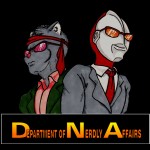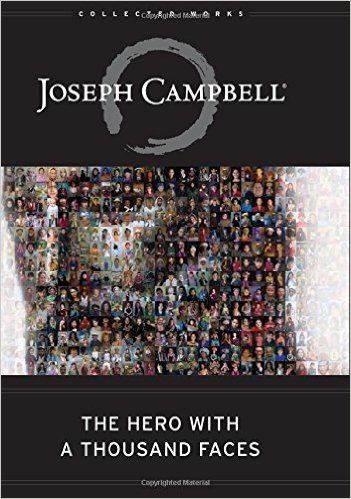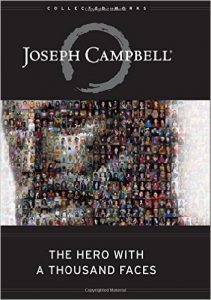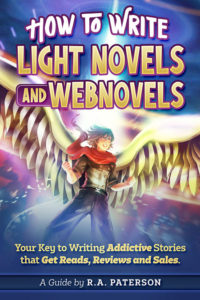
In this episode, Rob and Don are joined by Jack Ward for a spirited debate about Joseph Campbell’s Hero’s Journey. Does Campbell’s opus really hold the key to writing satisfying stories? Jack thinks so, but Rob and Don aren’t so sure, and this leads to a long discussion involving comparative mythology, newspaper comic strips, 1970’s vampire hunting reporters, and more sitcom references than an 80’s flashback! All this, and Don’s unhealthy fixation with the obscure scifi comedy Quark are waiting for you in this, the 35th episode of the Department of Nerdly Affairs.
- Closing Music:
Ode to Joy performed by Oliver Eckelt
Things Discussed
The Hero with a Thousand Faces (book)
Glove and Boots Heros Journey (in 5 minutes, with puppets)
The Power of Myth Bill Moyers/Joseph Campbell
Christopher Vogler Hero’s Journey Memo
Kishotenketsu For Beginners (Alternate Japanese Story Structure)
Buck Rogers
Mary Worth
Snuffie Smith
Blondie
Cousin Oliver/Brady Bunch
The Story Toolkit Podcast
Eating Raoul (trailer)
Captain Blood (Errol Flynn, trailer)
Quark (first episode)
Law and Order
Kolchak the Night Stalker
Understanding Comics by Scott McCloud
Who’s the Boss?






So;
I was thinkin’ on this episode, and how there’s SOMEthing I couldn’t articulate about the whole argument. I think it comes down to two ideas;
-One is the MOTIVATION through which a person creates a story. Jack…. ever the optimist…. speaks of what I’ll call LITERATURE. This I’ll define as stories written for the sake of the story. A lot of classic works fall into this category. Even if they were written strictly to make money for the author, they were written as a story and not as a property or license. (Shakespeare falls into this category.)
Modern stuff is a little different, since the story is quite often affected by external forces. Marketability, current trends, passing through a large number of hands from beginning to end. These two motivations affect the working definition of “connection,” and how one rates “success” or “effective.” Literature is more likely to be timeless, whereas modern stuff is often locked in time to the era it was made. Modern stuff is more likely to change, since it’s more likely a property owned by a company instead of a work by an individual. Rewriting Shakespeare is tantamount to sacrilege, unless you crib from his stuff for inspiration:
https://www.youtube.com/watch?v=IakulTGwc0U
https://www.youtube.com/watch?v=F17CCRoMttQ
Rewriting Batman happens every few years. Which ties into the second factor:
-Any character, story, setting exists in two forms: the REALITY, which is the actual produced material; and the IDEA, which is the notion of the character, story etc that the audience carries around in their head. They ARE different, and this gets at Jack’s idea of having to take the entirety of the produced works into account when analyzing something. THIS is where our ideas separate, since I take a lot of the behind the scenes, non-story related circumstances into account. This is where the modern licensing factors affect the story, and the finished product. Stuff like changing the character to better fit the tastes of the current audience, or when the story changes because an actor leaves.
The audience’s idea of a character is based on a cognitive set, made from the versions of the character they’ve seen and accept. This is one of the reasons I don’t see the Hero’s Journey as a universal; for characters since the late 1800’s, modern characters, licenses and franchises, a lot of their story is ad hoc. The character wasn’t designed for them, the story is often non-integral, and the depth the audience perceives is a result of gestalt psychology. BUT: that also keys in to what I was getting at with “Quark.” That a story…. no matter how simple, linear or episodic…. can have a BIG effect on the audience. And that’s okay; that connection, no matter how short lived is still a genuine event.
So I don’t see the Hero’s Journey as an essential for characters who are products, and I don’t see being a product as a disqualifier from being “good.” If you want a good example of how this works, check out Wolverine, and how convoluted HIS history has become over the decades. And yet; the fan pulls all of it together into a cohesive story in their head. Or if we go back to some of the shows we’d mentioned; stuff like the “will they or won’t they?” angle from shows like “Moonlighting” is generally a gimmick. It’s not written as an aspect of the character so much as a hook to hang some gags on. So any development happens not as a story point so much as either the changing tastes of the audience, or the writers running out of options for a story. It’s not the result of anything within the story…. and then when the audience sees this it becomes part of the cognitive set they have of the character and the idea of development is retroactively ascribed.
For me, I can’t see that as an expression of the Hero’s Journey so much of a pastiche of stuff that’s retroactively being woven into a story. Or not; I think nerd rage is what happens when the changes in an established property shift too far off the mental mark for an existing fan. And there are a lot of different ways that pastiche can come about…. hence the procedural. CONCEPTUALLY it’s a mix of bits. Sure; deciding to become a cop can be seen as the “call to action,” but for the writers it’s not; the character is a cop ‘cos this is a cop story. And while you’ll want to have a consistent personality for the character that personality is seldom fully formed. It’s a collection of traits. But that’s okay ‘cos it’s the mystery that’s the key. The characters are elements of the plot more than the other way around. And knowing that, and knowing the nuts and bolts of how a show is made prevents me from seeing it as an expression of the eternal hero. It’s something else. Something just as valid, but definitely something different.
Don C.